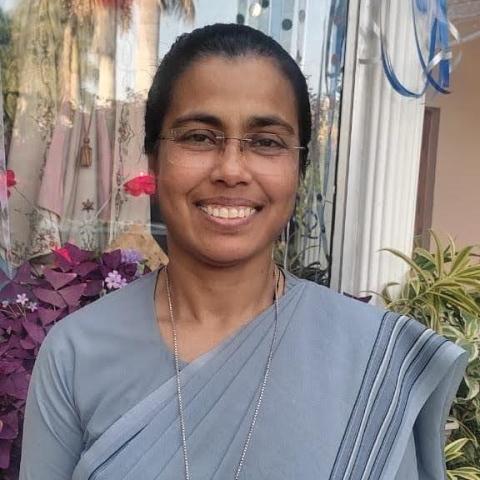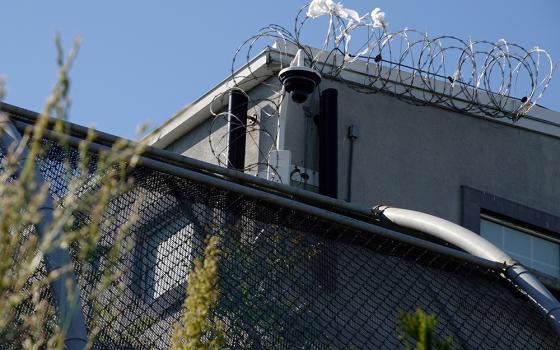
Sisters of John the Baptist Sr. Sally John addresses the core group members of Treasure, a sister-led mental health network, at the Catholic Hospital Association of India's headquarters in Secunderabad, southern India. (Courtesy of Sally John)
Sisters of St. John the Baptist Sr. Sally John is an associate professor of psychiatry at the Mahatma Gandhi Institute of Medical Sciences, Wardha, in western India. She is engaged in clinical care, teaching and community psychiatry, directing projects such as child and adolescent outreach, along with geriatric and palliative care programs.
John developed a holistic approach in psychiatry by integrating spirituality and faith aspects. She has treated mental health issues of several Catholic nuns and priests.
In 2024, she founded Treasure, a sister-led mental health network for women religious. John coordinates a network of Catholic psychiatrists, psychologists, psychiatric nurses, social workers and tech aides to address mental health needs of nuns.
John will participate in Global Sisters Report's health care forum on mental wellness July 1. John shared with GSR her mission of promoting mental health among Catholic nuns in India.
Global Sisters Report: Why did you start a mental health mission among Catholic nuns in India?
Sally John: In the past two decades, I have dealt with several cases of mental health issues among women religious in India, such as depression, anxiety disorders, panic attacks, obsessive compulsive disorders, dementia and suicidal tendencies.
As humans, sisters also face extreme stress and pressure in life. Immediate attention is given to physical health problems, but mental illnesses are ignored or covered up. This tragic situation prompted me to address nuns' mental health as a special mission.

Sisters of John the Baptist Sr. Sally John (Courtesy of Sally John)
Do you mean religious communities have little awareness and acceptance of mental illnesses?
Yes, because of a social stigma about mental disorders. Several sisters suffer in silence for years as they are afraid to speak about their mental health problems. Such problems exist in religious communities, but they are often misunderstood as escapism, or disobedience, lack of spirituality or prayer life. The communities misunderstand and isolate such people, adding to their problems.
How did you begin the mission?
While practicing as a psychiatrist in a general hospital, I started for destitute patients Jeevandhara (life stream) Centre, an integrative psycho-spiritual unit attached to our convent in Wardha. We had a few beds for sisters. I have attended to several sisters and some priests at Jeevandhara. They received well my integration of psychiatry with spirituality, but the myths about mental illnesses continue.
At Jeevandhara, we believe that the mentally ill can recover not only through clinical care and emotional support but a deep connection to one's inner self and to the Divine. We combine therapeutic interventions with spiritual accompaniment, prayerful environments and value-based living.
Daily routines include silence, guided reflections and prayer, which help our residents rediscover hope, meaning and dignity in their lives. We also provide medication, individual and group counseling, yoga, physical exercises and some occupational therapies.

Veinte miembros clave de la red de salud mental Treasure, dirigida por hermanas, aparecen en la sede de la Asociación Católica de Hospitales de la India, del 5 al 7 de mayo de 2025 en Secunderabad, en el sur de la India. La Hna. Sally John, su fundadora, es la cuarta por la derecha, sentada. (Foto: cortesía Sally John)
How do you find working with nuns with mental health issues?
Among some 200 sisters I have treated, more than 20% were cases of depression and an equal number had anxiety disorders and panic attacks.
Obsessive compulsive disorders (OCD) was yet another common mental illness which is associated with guilt or shame. I had a sister who went for confession every second day and my repeated sessions with her revealed a relationship issue where she had kissed someone. This led to extreme guilt and shame, leading to OCD.
Similarly, several clients were diagnosed with post-traumatic stress disorders that involved some sexual abuses in childhood.
India has reported several cases of suicides among nuns. Have you come across any such cases?
Often acute depression is linked to suicidal ideation. In fact, the immediate reason to start a network of sisters in mental health was due to the suicide of a nun who was under my treatment. She had acute depression and was under medication and continuous surveillance. But she escaped it all and hanged herself.
This was a big shock not only to me, but to everyone in her convent. They were in panic and I had to rush there to do all the procedures. It took several days of counseling and therapy to help them recover from the shock.
Advertisement
Do you think forced celibacy is a reason for the mental health problems among nuns?
There is no forced celibacy in religious life. It is an option every sister accepts during their profession of vows. What is lacking is a proper understanding of celibacy and a much-needed sexual education as part of the religious formation. There is a pressing need to educate the sisters on how to maintain mental health. In the absence of a healthy understanding of sexuality, some develop unnecessary guilt and shame leading to mental disorders.
Do sisters come to you on their own with their mental health issues?
Many come for treatment, but on condition that I should not reveal their problems to their congregation or community. It was a challenge as community support is essential in treating mental illnesses of nuns.
Initially, I provided "confidential treatment" as they desired, but I seriously thought of how to break this "silent suffering" of religious nuns inside four walls, struggling with their mental health and community life. This led to the formation of Treasure.

The members of Treasure, a mental health network among women religious, at a workshop in Secunderabad, southern India (Courtesy of Sally John)
What is Treasure? How did you arrive at that concept?
In the Bible, the word treasure is used in multiple contexts, referring to the kingdom of God, wisdom, knowledge, spiritual well-being and so on. Jesus used the metaphor of hidden treasure in a field to illustrate the great value of the kingdom of heaven. We adapted this word to explain mental health, a state which is essential for experiencing harmony and work for the kingdom of God. Mental health is a foundation to enjoy religious life in its fullness.
How does Treasure function?
Treasure has nearly 90 Catholic psychiatrists, psychologists and other mental health professionals to address mental health needs of nuns all over India. With the support and blessings of the Conference of Women Religious India and the Sister Doctors Forum, the network has grown.
We have formed a listening circle for the psycho-spiritual well-being of women religious, built a referral system, a database, consultants circle and an awareness platform. We are trying to reach out to convents across the country with our website and a WhatsApp channel.

The core group of Treasure, a mental health network among women religious, finalizes action plans for the next two years during their May 5-7 meeting at Secunderabad, southern India. (Courtesy of Sally John)
What is the main focus of Treasure?
Treasure stresses community-based approach. More than treating mental disorders, we spread awareness on mental health as part of ongoing formation. With proper understanding and awareness, several mild mental health issues can be corrected with mutual support and better understanding in convents or in their communities. Every congregation needs to take this as their top priority as anyone can get affected.
Treasure's three-phase model — information, intervention, infrastructure — blends spiritual accompaniment, community involvement, evidence-based therapy, medical treatment and provides a positive environment for nurturing mental health as an essential component of consecrated life.
The Conference of Religious Women in India also works in this direction. How do you collaborate?
We are part of the conference and work closely with its coordinating team. We provide professional assistance whenever needed and our members are active as one team.
You have just concluded a workshop on mental health. What was its outcome?
The workshop was a closed circle orientation for Treasure team members. Around 20 of us attended it. It was a significant milestone in our journey together as we streamlined tasks, formed dedicated teams, shared responsibilities, reviewed ongoing processes and clarified our referral ethics.
Why did you become a nun and a psychiatrist?
I think both were God's plans. However tired I am after listening to all disorders and depressive stories, I am able to live a happy life with the community.
My parents never wanted me to become a nun. They asked me to complete at least a bachelor's degree before deciding to join the convent. But I joined the congregation after 12th grade.
After my religious training, I wanted to do theology, but my superiors insisted I do medicine. I agreed. When several sister colleagues opted for gynecology and other branches of medicine, I decided to become a psychiatrist. And now, I have found my mission in promoting mental health among sisters of various congregations. I believe all this is part of my vocation.





